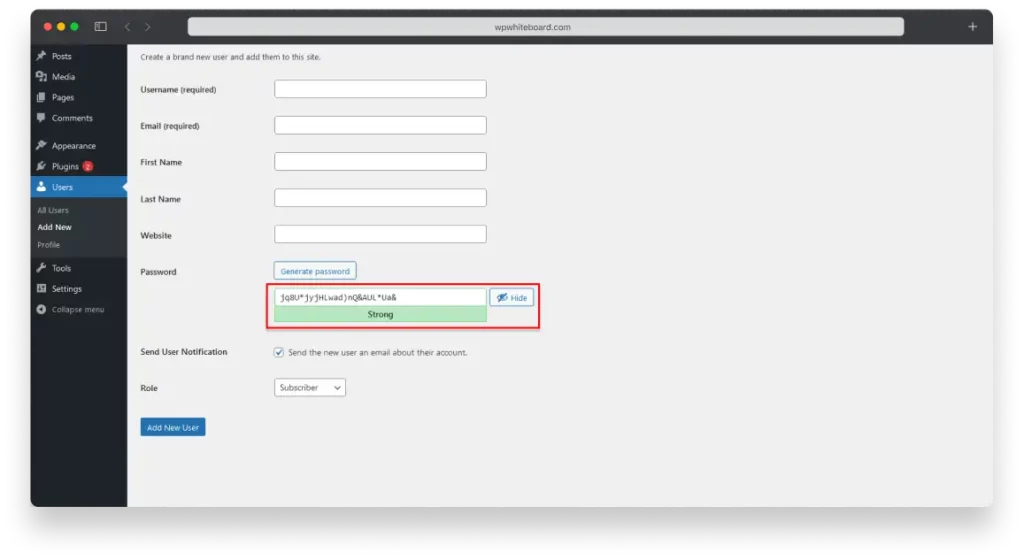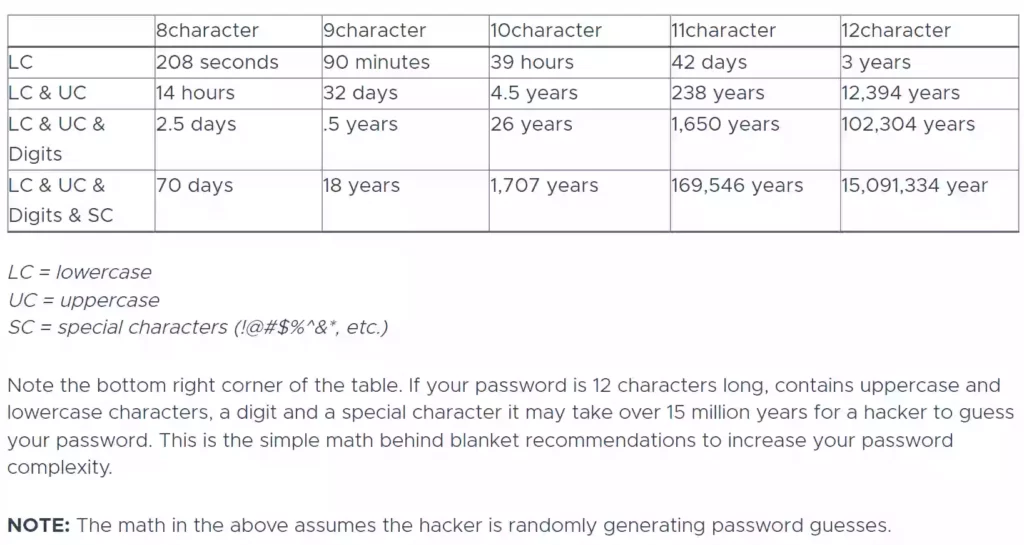
To make mistakes is human, but to profit from them is divine.
Making mistakes is a common part of being a human. We all fall, learn from our mistakes, and rise again. And even advanced conversational AIs, which have been a major topic of discussion this year, are also prone to errors (Hehe, it was a good one though, right?). But that’s nothing to be ashamed of. We should all embrace the fact that making mistakes is a natural part of the learning process.
Now, let’s turn our attention to business. Whether you’re a seasoned WordPress veteran or just starting out, there are certain common pitfalls that you’ll want to avoid. In this article, we’ll explore those pitfalls and learn how to keep your website looking sharp.
Index
- Using a weak or easily guessable password
- Choosing the wrong hosting provider
- Neglecting to backup your website
- Not optimizing images for the web
- Ignoring website security measures
- Not keeping WordPress updated
- Plugin Overdose
- Assuming SEO is dead
- Ignoring Website speed
Using a weak or easily guessable password
Let me start with the most basic and common mistake that WordPress users make – using a weak password. Many users use very simple passwords like “12345678” or “password”, which can be easily hacked. This type of simple password can be easily hacked by brute force attacks.
What is a brute force attack?
Brute force is an approach that uses all the possible solutions to find a satisfactory solution to a given problem. In a brute force attack, the algorithm uses all the possible passwords to get access to your site.
To simplify a little, let’s assume I am a robber, just an assumption 👤💰. And I want to open a suitcase which has a combination lock. If it has a two number combination lock, there can only be 100 combinations (i.e. 00 to 99). I will try out all the combinations one by one to open the lock. It’s the same with brute force attack, the hacker tries all the possible combinations to get access to your site.
To prevent this issue, be sure to use a strong and unique password that includes a combination of uppercase and lowercase letters, numbers, and symbols. I recommend using the password suggested by WordPress and storing it in a secure location, or create a password of your own. While creating your own password, make sure the box below the password field turns green and displays the word “Strong”.

Here’s a table showing exactly how long it takes to crack open a password:

Choosing the wrong hosting provider
When building your website, web hosting is essential for storing your files and making them accessible to users worldwide. As a core component of your website, selecting the wrong hosting provider can negatively impact performance and security. Performance issues may include slow loading times, frequent downtime, and sluggy server response times. Security issues may include a lack of security updates, data loss, and subpar customer support.
To prevent these issues, educate yourself on the different types of web hosting and select a reputable and reliable hosting provider that offers strong security measures and dependable performance. In addition to seeking out trustworthy hosting, other factors such as storage, space, bandwidth, and customer support should also be taken into consideration.
Neglecting to backup your website
What if the website you rely on for your daily expenses and bills just disappeared one day? Devastating isn’t it? Having a backup can help you quickly restore your website to its previous state and help you quickly recover from this devastating situation.
Here are a few reasons why you should backup your WordPress website:
- Environmental calamities: A fire, flood, or earthquake at the data center can damage all the equipment and cause widespread data loss.
- Technological failures: There can be manufacturing defects, and the equipment can stop working over time or due to poor maintenance.
- Theme and plugin updates: Updating your website’s themes and plugins is crucial for maintaining its security, but occasionally these updates can cause issues. By having a backup, you can update your themes and plugins with confidence, knowing that you have a safety net in case anything goes wrong.
- Malware attack: Malware has the potential to infiltrate your WordPress site through vulnerabilities in the core WordPress software, other software installed on your server, or via themes and plugins.
Even if you land in any of the unfortunate situations mentioned above, your backup can help you quickly restore the website to its previous state.
How often should you backup your WordPress website?
If you use your website for a blog, affiliate website, or any niche site, backing it up once per week is enough. If it’s an e-commerce site with a small audience, then it’s necessary to back it at least twice per day. However, if you have a large or busy e-commerce site then consider real-time incremental backup.
Not optimizing images for the web
Yes, people retain visual information for a longer period of time, and images play a major role in fulfilling this need. However, images that are not properly optimized can significantly slow down your website.
There are various formats for images like png, jpeg, webp, and svg and each format has its own use cases. Read about image optimization, various types of images, and its importance in detail. Also, there are various tools and plugins available that could help you optimize your images and make your website fast.
Ignoring website security measures
As the owner of a website, you may collect case-sensitive information such as names, dates of birth, passwords, social security numbers, credit card details, and more in accordance with your business requirements.
It is your responsibility to securely store and protect this sensitive information while ensuring it is used fairly. Neglecting website security measures can have severe consequences for both your website and your business.
Hackers can exploit security vulnerabilities to gain access to sensitive information, send spam emails, insert advertisements, redirect to other sites, install malware, sell user data, and even use server resources to generate cryptocurrency. Such breaches can result in lawsuits, heavy fines, and a tarnished reputation.
To avoid such consequences, take necessary steps to secure your website, such as using a strong password, keeping WordPress up to date, and using reputable security plugins. Learn about the Types of Security Threats WordPress Websites Face.
Not-so-fun fact: Every day, 30,000 new websites are hacked!! So taking security measures is not an option, it’s a vital requirement.
Not keeping WordPress updated
Running outdated software on your website is like leaving the front door of your home wide to hackers. They always try to find new terms and methodologies to gain access to your site. To combat this, WordPress frequently releases updates to fix bugs and address security vulnerabilities.
To ensure your website is secure, log in to your WordPress dashboard regularly and check for any available updates. It’s also a good idea to create a backup of your site before updating, to prevent any potential data loss that may occur during the update process.
Note: WordPress releases major updates and new versions every 2-3 months, focused on improving the system’s security and addressing its security vulnerabilities. It also ensures that the platform remains up-to-date with the latest trends and technologies.
Plugin Overdose
Plugins add functionality and new features to your site and everyone loves a feature filled site, but too many plugins can create a clutter-ey situation for your website. More plugins mean more code, and more code means slower loading time.
Having too many plugins can slow down your site and create compatibility issues. So only install the plugins that are necessary, and turn off or uninstall the unnecessary ones. Read about What, Why’s, and How’s of WordPress Plugins here.
Assuming SEO is dead
There are a lot of memes revolving around the internet titled “SEO is dead”. These memes started emerging due to various reasons, like
- Constant algorithm updates: Search engines frequently update their algorithms, which affect the website rankings and caused fluctuations in search rankings.
- Increased competition: A decade ago, it was easy for websites to rank on the first page of search engines. But as time passed and more businesses started to transform digitally, the competition increased. Making it more challenging to achieve and maintain search rankings.
- Digital marketing strategies: With the rise of new age digital marketing strategies like social media marketing, influencer marketing, and paid advertising. Many people failed to catch this digital wave and keep up with the latest marketing trends.
These are some of the reasons why people think SEO is dead or no longer relevant.
SEO has certainly evolved over the years, and the strategies and tactics to improve it have also changed a lot. But it still remains an important aspect that cannot be ignored if you want to attract and retain customers.
Conduct keyword research, optimize website content, and use tags and meta descriptions for better SEO results. You can also use the assistance of plugins like Yoast SEO for better visibility.
Ignoring Website speed
Lastly, many WordPress users make the mistake of neglecting website speed and performance. It has a significant impact on user experience, business goals, and search engine rankings.
You can improve the speed of your WordPress site by organizing the page structure, optimizing images, and regularly checking your website’s speed and performance using tools like GTmetrix, Pingdom Tools, and Google Page Speed Insights.
Conclusion
I hope this article helped you to gain knowledge, but it’s not just about knowing things, it has always been about doing things. Create a checklist with sticky notes for your desk or a digital checklist on your computer, and make sure to check it regularly. A little effort and attention to detail can go a long way in ensuring the success and longevity of your WordPress website. Happy building!
What are the common mistakes to avoid while creating a WordPress website?
Common WordPress mistakes while creating a website include – Choosing a wrong theme, weak security, overloading website with plugins, not setting up analytics, using images that aren’t optimized, testing changes on live site, and improper use of tags and categories.
What are the most common WordPress security issues?
Some of the most common WordPress issues are unsanctioned logins, outdated core software, outdated themes and plugins, undefined user roles, malware, SQL injections, SEO spam, Cross-site scripting attack, Denial of service attack, phishing, supply chain attacks, hot linking, cross-site forgery attack, and weak hosting infrastructure. Read about each security issue in detail.
How do I check for errors in my WordPress website?
Go to Websites & Domains > the site’s domain name > click File Manager. Navigate to your /wp-content/ folder in your File Manager. Select the Logs in the left frame and click error_log in the list. You can also use tools like GTmetrix, Pingdom tools, and Google Page Speed Insights to check your website’s speed and performance.
































